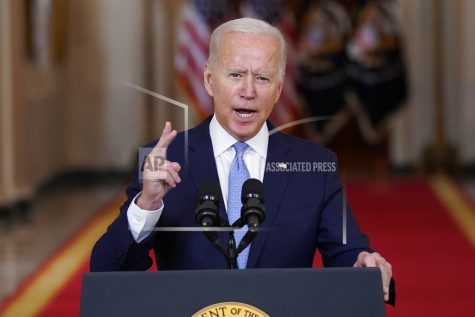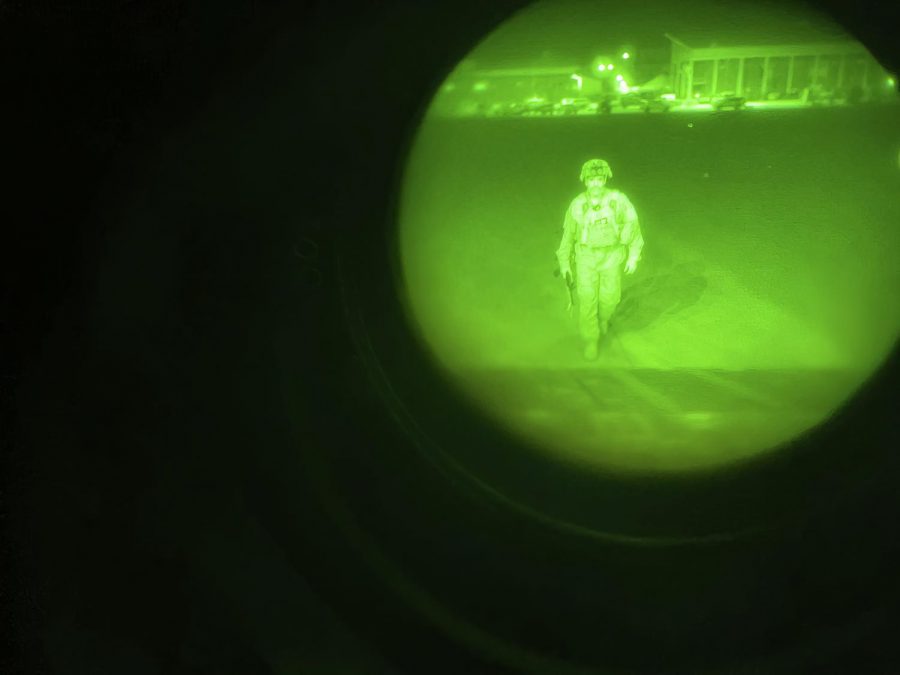Afghanistan: How America fell to the “Graveyard of Empires”
Maj. Gen. Chris Donahue, commander of the U.S. Army 82nd Airborne Division, XVIII Airborne Corps, boards a C-17 cargo plane at Hamid Karzai International Airport in Kabul, Afghanistan as the final American service member to depart Afghanistan. (US Army/Master Sgt. Alexander Burnett)
Sep 17, 2021
President Joe Biden announced in April his intention to withdraw all American troops from Afghanistan by Sept. 11, the twentieth anniversary of the attacks on the World Trade Center and Pentagon. Though this was pushing back the original withdrawal date negotiated between President Donald Trump and the Taliban, this announcement was initially met with bipartisan approval, notably from far-right Biden critic Sen. Josh Hawley. I myself applauded the move in a column back in May. However, as the U.S. forces began their exit in August, the Taliban sprung into action. In May, the Taliban began a nationwide assault on the relatively-new Islamic Republic of Afghanistan, slowly gaining back more and more territory. However, by late July, the Taliban had gained even more ground, eventually reaching the capital of Kabul. On Aug. 15, Afghan President Ashraf Ghani fled the country, and the Taliban seized control of Kabul. Over the next two weeks, as American forces continued to withdraw, a ceasefire was reached at the Kabul airport, as Allied forces worked to evacuate American citizens and fleeing Afghans. However, these evacuations were interrupted by Afghan ISIS affiliate ISIS-K when a suicide bomber detonated in the Kabul airport, killing 73 people, including 13 American service members. Finally, on Aug. 30, the final U.S. soldier lifted his boot off of Afghan soil, ending a just under two-decade-long war and occupation. The Taliban retook control of the Kabul airport, with an estimated 100 Americans remaining in the country.
The ending of America’s longest war was ugly and brutal. But it was also probably one of the smartest foreign policy actions made by this country in the modern era.
Let me be clear: there are many, many things to critique concerning the withdrawal itself. For example, in the haste of retreat, U.S. forces abandoned billions of dollars worth of vehicles, weapons, and equipment that fell into Taliban hands. Additionally, the tragic loss of the 13 service members brought even more public scrutiny on the already controversial endeavor. Moreover, many have criticized the decision to pull out troops before every American citizen had been evacuated (though White House Chief of Staff Ron Klain assured that the U.S. would find ways to get them out).
However, while I am not arguing that the ends justify the means, the end of the War in Afghanistan warrants observance. I would argue the War in Afghanistan actually ended on May 2, 2011, when Osama bin Laden was assassinated by Navy SEALs in Pakistan, at which point the Occupation of Afghanistan began. We had accomplished our goals set in the aftermath of 9/11: bin Laden was dead, al-Qaeda was all but eradicated and the Taliban was out of power. So that begs the question: why were we there for another decade?
I would argue it’s due to a combination of war-hawk mentality, the media and corporate interests. Historically, both political parties have been eager to either go to war or take military action to solve the country’s foreign policy issues. This is best exemplified by the bipartisan supermajority that sent U.S. troops to die in Iraq in a pointless, unjust war. In the U.S., politicians seemed to be obsessed with war (and not without reason: presidential approval ratings historically have gone up after military action). And these pro-war sentiments are amplified by the second reason for our prolonged occupation: the mainstream media.
The media, especially in the 21st century, loves a good war. You saw this in the years following 9/11, when the media was at the front of the effort to get the public behind the Iraq War. As Green Day so eloquently put it in their 2004 masterpiece American Idiot, the mainstream media helped usher in an, “information age of hysteria”. As the decade turned, this never truly died down. That brings us to the present day. If you watched cable news in the last month and a half, you saw panels and guests stumping against either the logistics and optics of the withdrawals (in which case, fair point) or those in support of outright staying. From the beginning, the media worked against the Biden administration when it came to the withdrawal from Afghanistan. You saw this with some of the aforementioned hawks of the Bush, Obama and Trump administrations brought on to peddle warmongering, like Leon Panetta, Karl Rove and the infamous John Bolton.
Lastly, corporations at that point had way too much invested in the war to call it quits. For a lot of companies, the forever wars in the Middle East were the goose that laid the golden egg. When the final U.S. soldier left Afghanistan, the stock value for the war’s corporate backers, like Lockheed Martin, Raytheon, and General Dynamics, was through the roof. That’s not even getting into the collective $5 trillion made by private military contractors in both Afghanistan and Iraq. And how did these corporations spend their war profits? Lobbying and donating to a bipartisan group of pro-war politicians. At this point, I hope you can see the despicably efficient cycle that has keep the United States perpetually at war the last twenty years: hawkish politicians want war, the media elevates their voices to turn public opinion, the public then wants war, the corporations make lots of money off of the war, and then lobby and fund the hawks. And then the cycle continues.

With this in mind, the fact that a U.S. president actually went and ended one of the country’s biggest cash-cows and propaganda generators is nothing short of astonishing. I fully believed that Biden, who was initially one the the biggest Iraq hawks, would simply fall to public pressure and call off the withdrawal, leaving troops to combat Taliban forces, prolonging the war for who knows how much longer. It was to my surprise when he planted his feet firmly in the ground, amidst massive public scrutiny, and succeeded in ending America’s longest war. This extends to his administration, as just this week U.S. Secretary of State Antony Blinken defended himself and the withdrawal before the House Foreign Affairs Committee.
For all intents and purposes, the War in Afghanistan (and I would argue, the War on Terror in general) was a massive failure. A Taliban government was in power when we invaded, and a Taliban government is in power as we leave. We lost. It hurts, I get it. A lot of younger people my age weren’t around for Vietnam, so this is the first time we’ve seen our country truly crumble on the world stage. A lot has been sacrificed, particularly by service members, all seemingly for nothing. Strong emotions are completely understandable. But anyone who argues that these problems could be solved by another twenty year occupation is just not in touch with reality. And though Biden has faced scrutiny over the withdrawal itself, his overall actions were not unpopular; the public has been opposed to the prolonged war for quite some time. In fact, it was Bush alumni Nicole Wallace who said it best: “Ninety-five percent of the American people will agree with everything [Biden] just said (referring to his press conference defending the withdrawal). Ninety-five percent of the press covering this White House will disagree.”
All in all, while I would agree ending the War in Afghanistan was a very, very ugly success, there are many questions that will need to be answered. For example, the War in Afghanistan cost American taxpayers $300 million a day, every day, since 2001. With the war over, where will that money go? Will the federal government invest that into programs to benefit the well-being of the public, or will it go to the military-industrial complex regardless? Additionally, over twenty-four thousand Afghan refugees have arrived in the U.S., housed on military bases. That is a very pressing crisis that will need to be addressed. Furthermore, the international community will have to keep its eye on the well-being of the Afghan people as they are subject to radical Taliban rule. These are all problems that need to be addressed, but will not be answered by a prolonged war with no clear victory in sight. Afghanistan has long been known as, “The Graveyard of Empires”, and for good reason. The Mongols failed. The British failed. The Soviets failed. The Americans failed. At least the U.S. had the sense to call it quits before it got worse.













